
The commandant of the Marine Corps (CMC) is normally the highest-ranking officer in the United States Marine Corps. It is a four-star general position and a member of the Joint Chiefs of Staff. The CMC reports directly to the secretary of the Navy and is responsible for ensuring the organization, policy, plans, and programs for the Marine Corps as well as advising the president, the secretary of defense, the National Security Council, the Homeland Security Council, and the secretary of the Navy on matters involving the Marine Corps. Under the authority of the secretary of the Navy, the CMC designates Marine personnel and resources to the commanders of unified combatant commands. The commandant performs all other functions prescribed in Section 8043 in Title 10 of the United States Code or delegates those duties and responsibilities to other officers in his administration in his name. As with the other joint chiefs, the commandant is an administrative position and has no operational command authority over United States Marine Corps forces.
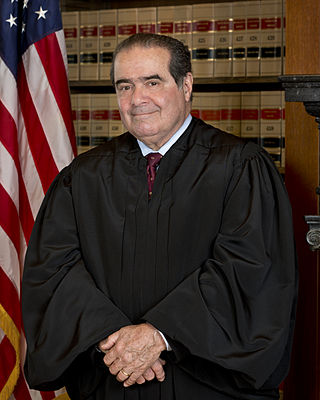
Antonin Gregory Scalia was an American jurist who served as an associate justice of the Supreme Court of the United States from 1986 until his death in 2016. He was described as the intellectual anchor for the originalist and textualist position in the U.S. Supreme Court's conservative wing. For catalyzing an originalist and textualist movement in American law, he has been described as one of the most influential jurists of the twentieth century, and one of the most important justices in the history of the Supreme Court. Scalia was posthumously awarded the Presidential Medal of Freedom in 2018, and the Antonin Scalia Law School at George Mason University was named in his honor.
Rasul v. Bush, 542 U.S. 466 (2004), was a landmark decision of the United States Supreme Court in which the Court held that foreign nationals held in the Guantanamo Bay detention camp could petition federal courts for writs of habeas corpus to review the legality of their detention. The Court's 6–3 judgment on June 28, 2004, reversed a D.C. Circuit decision which had held that the judiciary has no jurisdiction to hear any petitions from foreign nationals held in Guantanamo Bay.
Hamdi v. Rumsfeld, 542 U.S. 507 (2004), is a United States Supreme Court case in which the Court recognized the power of the U.S. government to detain enemy combatants, including U.S. citizens, but ruled that detainees who are U.S. citizens must have the rights of due process, and the ability to challenge their enemy combatant status before an impartial authority.
Judicial disqualification, also referred to as recusal, is the act of abstaining from participation in an official action such as a legal proceeding due to a conflict of interest of the presiding court official, administrative officer or other decision-maker. Applicable statutes or canons of ethics may provide standards for recusal in a given proceeding or matter. Providing that the judge or decision-maker must be free from disabling conflicts of interest makes the fairness of the proceedings less likely to be questioned, and more likely that there is due process.
Hamdan v. Rumsfeld, 548 U.S. 557 (2006), is a United States Supreme Court case in which the Court held that military commissions set up by the Bush administration to try detainees at Guantanamo Bay violated both the Uniform Code of Military Justice (UCMJ) and the Geneva Conventions ratified by the U.S.

Salim Ahmed Salim Hamdan is a Yemeni man, captured during the invasion of Afghanistan, declared by the United States government to be an illegal enemy combatant and held as a detainee at Guantanamo Bay from 2002 to November 2008. He admits to being Osama bin Laden's personal driver and said he needed the money.
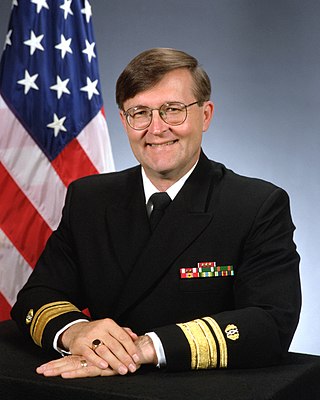
John Dudley Hutson is a former United States Navy officer, attorney, and former Judge Advocate General of the Navy. He is a former dean and president of University of New Hampshire School of Law in Concord, New Hampshire, having served in the position from 2000 to 2010.

Charles D. Swift is an American attorney and former career Navy officer, who retired in 2007 as a Lieutenant Commander in the Judge Advocate General's Corps. He is most noted for having served as defense counsel for Salim Ahmed Hamdan, a detainee from Yemen who was the first to be charged at Guantanamo Bay; Swift took his case to the US Supreme Court. In 2005 and June 2006, the National Law Journal recognized Swift as one of the top lawyers nationally because of his work on behalf of justice for the detainees.
James P. Cullen was a brigadier general in the United States Army who served in the Judge Advocate General's Corps.
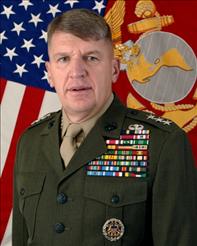
Richard F. Natonski is a retired United States Marine Corps lieutenant general whose last assignment was as the Commander of U.S. Marine Corps Forces Command. He assumed the post in August 2008, having previously served as the United States Marine Corps Deputy Commandant for Plans, Policies and Operations from 2006. He retired at Marine Barracks 8th & I on 8 September 2010.
The United States Marine Corps' Judge Advocate Division serves both to advise the Commandant of the Marine Corps (CMC) and other officials in Headquarters, Marine Corps on legal matters, and to oversee the Marine Corps legal community. The head of the Judge Advocate Division (JAD) is the Staff Judge Advocate to the Commandant.
Kevin M. Sandkuhler is an American lawyer, and retired brigadier general in the United States Marine Corps. His 2003 memo expressing concerns about the US interrogation of terrorism suspects, released in 2005 after a declassification request by Senator Lindsey Graham, received national and international attention.
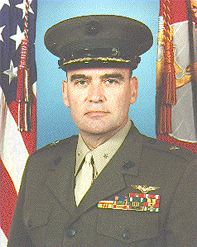
Michael C. Wholley is a former General Counsel for NASA and a retired United States Marine Corps Brigadier General.

James Donald Hittle was a decorated officer in the United States Marine Corps with the rank of brigadier general. He is most noted for his service as legislative assistant to the commandant of the Marine Corps, between June 1952 and January 1960. Following his retirement from the Marine Corps, Hittle served as United States Assistant Secretary of the Navy from March 1969 until March 1971.

David Hilberry Berger is a retired United States Marine Corps general who served as the 38th commandant of the Marine Corps from 2019 to 2023.
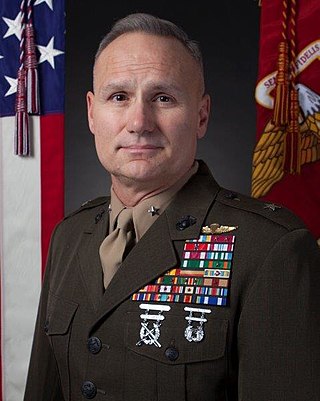
Norman Lee "Norm" Cooling is a retired Brigadier General in the United States Marine Corps, who most recently served as the Assistant Deputy Commandant for Plans, Policies & Operations, Headquarters, United States Marine Corps and who previously served a number of roles during deployments in support of Operation Enduring Freedom in Afghanistan and Operation Iraqi Freedom, notably as the battalion commander of 3rd Battalion, 3rd Marine Regiment.

St. Julien Ravenel Marshall was officer in the United States Marine Corps with the rank of brigadier general. He distinguished himself as Intelligence officer (G-2) of V Amphibious Corps during World War II. Marshall also served with the group that established the Central Intelligence Agency after the war. His older brother was Major General Richard Marshall.











